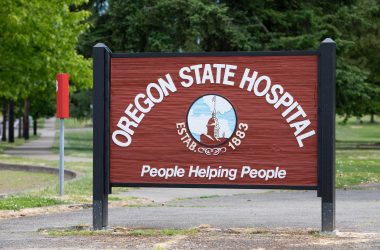The Oregon Legislature made progress this year on addressing the state’s housing crisis with new policies and $1.2 billion in new spending on housing and homelessness but more work needs to be done, Gov. Tina Kotek said Thursday.
Flanked by state legislators and homeless advocates, Kotek hosted a ceremonial bill signing for four housing bills – two of which she already signed into law earlier this month – and pledged to continue working to address the state’s housing shortage and affordability crisis. At least 18,000 Oregonians were homeless on a single night in 2022, and state analysts predict Oregon needs to build at least 500,000 homes over the next two decades to keep pace with demand.
“Whether you’re on the coast, in the valley or out in the beautiful Wallowa mountains, every community is wrestling with how they provide more housing for their community,” Kotek said. “Whether it’s land, whether it’s bureaucratic barriers, whether it’s the workforce that has to build it or how you finance these projects, all of these things are top of mind in communities across our state.”
Two of the new laws are intended to provide predictability to renters. House Bill 3042, which Kotek signed Thursday, prohibits owners of formerly publicly supported affordable housing from ending leases with tenants for the three years after affordability restrictions end. It also requires more notice.
And Senate Bill 611, which Kotek signed earlier in July and highlighted Thursday, will prevent a repeat of the nearly 15% rent hikes landlords were allowed to levy this year. Now, landlords will have a hard cap of 10% rent increases when inflation is high. It builds on a 2019 law that limits increases on properties 15 years or older to no more than 7% plus inflation.
“That predictability helps prevent evictions, and we know the most efficient way to help people is not to let them become homeless in the first place,” Kotek said.
House Bill 3395, which Kotek signed earlier this week, will make it easier to build affordable housing on land now zoned for commercial use and restrict local governments’ ability to block affordable housing or homeless shelters. And Senate Bill 5511, which she signed Thursday, allocates more than $2.5 billion to Oregon Housing and Community Services over the next two years, including money for homeless shelters and rent assistance.
Those new laws followed an early $200 million investment to build more shelters and provide rent assistance, new planning requirements for cities to meet Kotek’s goal of building 36,000 homes annually and an extension of eviction notice requirements to give tenants more time to catch up on late rent.
Rep. Maxine Dexter, a Portland Democrat and physician who chairs the House housing committee, said many of the new laws and spending will take time to make a difference.
“We have built too few homes in the state for decades, and it will take time and sustained focus to achieve our shared vision of every Oregonian having access to safe and stable housing,” Dexter said.
Kotek’s housing agenda for next year will be based on recommendations from her Housing Production Advisory Council, which is meeting regularly and will produce a list of recommendations by the end of the year. She didn’t have many specifics to share Thursday, but said addressing the state’s land supply issues will be part of the plan.
Senate Democrats on the last day of the legislative session killed a bill Kotek backed that would have allowed cities to circumvent the state’s strict land laws on a one-time basis to designatemore land from outside city limits for housing. She’ll bring a new version of that proposal to the Legislature in February, she said.
“Despite the progress, the crisis continues,” Kotek said. “Those who know me know that I might rest for about 30 minutes and then say ‘OK, what’s next?’ We have more work to do. And so I’m eager to work with everyone here to go forward on the things we need to make happen because we need more change in addition to the progress today.”

Kotek coy on payroll tax, bill to pump your own gas
During a short press conference after her bill signing ceremony, Kotek declined to directly answer questions about whether she supported a payroll tax passed by the city of Salem or a bill on her desk that would allow more Oregonians to pump their own gas.
She’ll have to signal whether she’ll veto the gas bill, House Bill 2426, by Friday, a deadline to give notice about any plans to veto legislation. It would become law without her signature on Aug. 4 if she neither signs nor vetoes the measure.
Only Oregon and New Jersey limit self-serve gas, though Oregon has rolled back restrictions in rural areas and during statewide emergencies, including the COVID pandemic and extreme heat. Kotek signed a law earlier this summer to allow the Rivers Run gas station in Detroit, the last opportunity to fuel up before Sisters, to offer self-serve gas at all hours through 2028. The area was damaged by wildfire in 2020 and the station’s owner told lawmakers she couldn’t hire enough workers to provide full-service gas.
HB 2426 would allow stations throughout the state to offer self-service gas on up to half of their pumps, with the same prices for self-service and full-service pumps. Kotek said she’s still hearing from Oregonians with strong opinions about the proposal, and she’s not swayed by arguments that Oregon is an outlier.
“‘Just because everybody else does it’ is not a good argument,” she said.
She also avoided taking a stance on the city of Salem’s recently approved payroll tax, which she and many other state employees will have to pay if it takes effect next year. A major business lobby group is leading a petition drive to refer the tax to the ballot.
The tax, approved by the Salem City Council on a 5-4 vote, would take 0.814% of workers’ paychecks for all work done in Salem. That’s about $800 annually for Kotek, who earns $98,600 to lead the state, and about $500 for a worker earning the average Salem wage of just under $30 per hour.
Kotek said she didn’t speak to Salem leaders about their plans for the tax and that she understood why city leaders made the choice they did. Salem Mayor Chris Hoy, who attended the bill signing, crouched to duck behind other guests when a question about the payroll tax came up.
Kotek said she wants to have a conversation about the state’s role in paying for local government services in Salem because the state doesn’t pay property taxes on the property it owns in the capital city.
“I understand that they need to fund services, and part of the reason they’re doing that is the fact that the state government is in Salem, and they aren’t able to collect certain types of revenue because of the placement of state office buildings,” she said. “Let’s have that conversation. My sense is signatures are gonna get collected to take that to the voters and then the voters are going to be able to decide if they want to go down that path.”
Oregon Capital Chronicle is part of States Newsroom, a network of news bureaus supported by grants and a coalition of donors as a 501c(3) public charity. Oregon Capital Chronicle maintains editorial independence. Contact Editor Lynne Terry for questions: [email protected]. Follow Oregon Capital Chronicle on Facebook and Twitter.
STORY TIP OR IDEA? Send an email to Salem Reporter’s news team: [email protected].

Julia Shumway is deputy editor of Oregon Capital Chronicle and has reported on government and politics in Iowa and Nebraska, spent time at the Bend Bulletin and most recently was a legislative reporter for the Arizona Capitol Times in Phoenix. An award-winning journalist, Julia most recently reported on the tangled efforts to audit the presidential results in Arizona.









